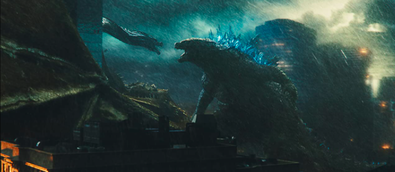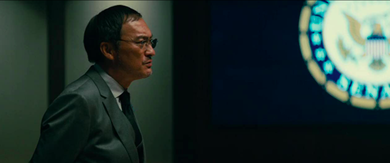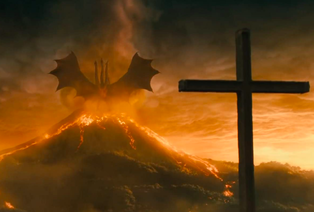
Please note: The following text contains spoilers. Viewer discretion is also advised – Godzilla: King of the Monsters is rated ‘12’. For more details on the film’s content from a Christian perspective, read Focus on The Family’s review from Plugged In:
https://www.pluggedin.com/movie-reviews/godzilla-king-of-the-monsters-2019/
Just over two weeks ago, Warner Bros. Pictures released the first trailer for Godzilla vs. Kong, the much-delayed, sure-to-be epic showdown between two of cinema’s most beloved titans of the monster genre. And, thankfully, it looks as if it will certainly deliver on the wild, bombastic action sequences people have come to expect from such planet-shaking dustups. But to tide me over with sufficient monster carnage until March 26th (one can hope), I decided to revisit 2019’s Godzilla: King of The Monsters – a film I largely dislike, but upon rewatch, found to contain a variety of themes which prompted spiritual reflection. And I know what you’re thinking, but yes, even a Godzilla movie with the thematic subtlety of a sledgehammer, can sometimes be used to begin a conversation about faith.
With the plot largely based around scientists who work for the mysterious (and sometimes shady) scientific organisation Monarch, King of The Monsters often plays heavily into the studying of titans like Godzilla. Various characters are often seen tracking and monitoring the titans’ behaviour, health and movements, with a view to control them, but other scientists do so out of sheer reverence and awe. One such character, Dr. Ishiro Serizawa (Ken Watanabe), believes Godzilla (or “Gojira”) to be a potentially dangerous force beyond our comprehension – one who cannot be corralled or manipulated into doing the bidding of humanity. Instead, Serizawa proposes that humanity should abandon its hubristic leanings, and take on a posture of reverence and fear towards this beast and others, partly because in the presence of such god-like beings, their human power and reach is miniscule. But mainly, Serizawa understands that Godzilla isn’t a mindless killing machine – rather, he’s something more entirely.
If we actually look to his interactions with the beast, Serizawa chooses never to open fire or disturb the creature as best he can. He takes a back seat and permits Godzilla to move on, thereby ensuring that his lifestyle remains uninhibited by human interference. In fact, whilst he does everything short of bowing before him, Serizawa clearly exhibits fear, awe and reverence whenever standing before Godzilla. And such behaviour brought to mind for me, the biblical notion of what it can mean to fear the Lord. For whilst the term “fear” traditionally means to be “afraid of someone or something”, the biblical understanding of the term is far more nuanced and can mean several things. For one, “fear” can be linked to experiencing terror in times of difficulty (Deuteronomy 2:25), or respectfully and faithfully serving those who are above you, because you may fear their discipline (Joshua 24:14). “Fear” can also entail expressing reverence or awe, in the presence of an almighty God (Isaiah 6:5). But it doesn’t necessarily mean to be afraid of something. And Serizawa’s behaviour suggests that he was not afraid of Godzilla, because he considered this intelligent, remarkable being, to be capable of forging a “symbiotic relationship” with humanity.
Throughout the film, Serizawa and his fellow scientists explain that for the world to survive these encounters with titans such as Godzilla, and live amongst them, they must come to accept that they are not powerful enough to destroy or control them, and so their only hope is to learn what it means and what it looks like, to coexist alongside them. Their answer is to form a “sort of symbiotic relationship” with the titans, much like “the lion and the mouse” or the “scorpion and the frog”. But this is done from a place of unhealthy fear and a desire only to preserve life, not a yearning to understand the titans, or forge some semblance of relationship with them - for the term “relationship” traditionally means that two parties are genuinely, closely connected to one another. So, whilst true relationship isn’t possible between these god-like titans, it’s important to note the Bible teaches that God (the undisputed Lord of all) offers genuine relationship to humanity and doesn’t wish for us to ever live from a place of unhealthy fear towards Him. For being afraid of someone drives you away from them, but to fear God means to be awed by His unique power and goodness, which draws us closer to Him so that we might receive His blessings of forgiveness, peace and so much more.
In the film’s final act, Serizawa tells his team that humanity’s survival can only be secured, if they treat Godzilla with reverence and place their faith in him, instead of simply fearing him: “He fought for us. Died for us. He’s not only proof that coexistence is possible. He is…the key to it.” It’s one of the film’s more touching moments, not least because these are Serizawa’s parting words, spoken before he sacrifices himself to save humanity. But they ring true, because this reveals a certain Christological subtext which links nicely into the subject of reverence and fear. For when the humans decide to humbly join with Godzilla in his fight against a three-headed monster (one who brings to mind images from The Book of Revelation, especially when the creature stands threateningly before a cross of Christ), the two species are revealed to then be able to live and work in peace with one another.
And the same can be argued for humanity’s relationship with God. When we come to recognise all that God, in His boundless power, could do to humanity in punishing us for the wrong we have committed against Him (just as the humans did to Godzilla), we should honestly count ourselves unworthy to know or even consider drawing close to Him. Especially since “everyone has sinned” (Romans 3:23, NLT) and “the wages of sin is death” (Romans 6:23, ESV), by God’s holy standards. But humanity can choose to rejoice in the knowledge that God has chosen to not only let us live but receive access to His mercy and forgiveness. Why? Because He loves us, and this “is how we know what love is: Jesus Christ laid down his life for us” (1 John 3:16, NIV) on the Cross, and rose to life three days later, having defeated the barrier of sin, death and darkness which prevented us from drawing close to God and lead only to eternal death. Not only can we live in relationship with Him today, but we can draw close and live alongside Him as close friends. And the film does a very good job of depicting such a relationship: In Serizawa’s final moments, he stands before a resting Godzilla who awakens as the man places the palm of his hand, upon his snout. It’s a terrifying moment, but one which encapsulates beautifully, how we fear God for His awesome power, but can love and draw close to Him because with that same power, He also cares for us and promises to do so for all those who accept Him into their life. Long live the One, true King.
Challenge:
Why not prayerfully invite a friend or family member who doesn’t yet know Jesus, to watch Godzilla: King of the Monsters? Use the film’s themes to ask them what they thought of the film, if they spotted any links to Christianity and what they might think of the Gospel’s response to this subject.
If you feel able to, ask them what they think about the film’s view of reverence and fear for Godzilla. What does it mean to have reverence for something? Did they feel that there was a clear distinction made in the film, between fearing something and having a deep reverence for it? Did they fear Godzilla more than feel for him? If God became real for them in an awesome way, would they fear Him, or be in awe of Him, or both? Would they consider even drawing close to Him? Do they think they would even be worthy enough to come close to Him?
Later, prompt them to consider their own views of a relationship between God and humanity. Take the opportunity to share the hope of the Gospel message with them – noting that God, because of the sacrifice of His one and only Son, Jesus, we can draw close to Him even though we deserve to be apart, because of our many sins. And be sure to clarify that whilst the film’s characters live in an unhealthy fear of these god-like creatures, we can abandon that fear and embrace the love of God that He wants to share abundantly with them today. Then, invite them (if you feel prompted to by God) to consider accepting Jesus into their life today.
Prior to watching the film for yourself, however, take a moment to pray that God would speak to you through the film. If you feel comfortable, pray this prayer over all of your future, film-watching experiences:
Dear Lord, as I watch this film, I ask that you would be present here with me. Highlight to me anything within it that is honourable, anything that can be used in conversation for your Kingdom purposes. Amen.
Godzilla: King of the Monsters is currently available to purchase online in the U.K. through Amazon Prime Video, AppleTV, Sky Store and YouTube.




 RSS Feed
RSS Feed